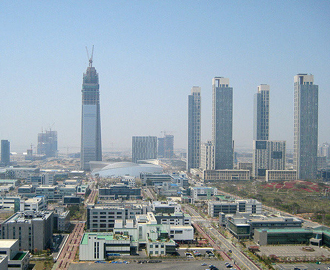The South Korean port city of Incheon has been chosen over other cities around the world to host the headquarters of the United Nation’s Green Climate Fund (GCF).
The future site of the GCF was decided Saturday by a vote of its 24 board members at a meeting held in Incheon’s Songdo district . Their selection of Songdo as GCF’s first headquarters will become official at the end of November when it is endorsed at the 18th session of the United Nations Framework Convention on Climate Change in Qatar.
Germany, Switzerland, Poland, Mexico and Namibia had all vied to host GCF, an entity often referred to as the World Bank of the environmental sector. GCF’s first full year of operation will be 2020. By that time it is expected to be funded at $100 billion. If GCF expands according to current plans — which calls for core member nations to raise more capital — the fund will grow to $800 billion by 2027.
“The GCF organization will steadily expand in the future and it will have more and more affiliated groups as well,” President Lee Myung-bak told the press Saturday.
“I think it’s a blessing for the Korean people,” Lee added. “For the first time in our history, we will host one of the biggest international organizations.”
Once the GCF secretariat establishes its headquarters in Incheon’s Songdo International Business District, it will be the first major international organization to be based in Korea. The nation hopes to reap economic benefits and prestige as GCF’s host.
The GCF could ultimately become bigger than the IMF or the World Bank if member nations meet their fundraising commitments, said Kim Sang-hyup, senior presidential secretary for green growth.
The economic impact to Korea of hosting GCF’s headquarters is estimated to be about 380 billion won ($344 million) annually, according to the state-operated think tank Korea Development Institute (KDI).
“We expect the hosting of the GCF to trigger a ripple effect on the local economy,” Song Young-gil, mayor of Incheon, said at a press conference. “The effect can’t be compared to hosting an Asian Games because a sports event is just a one-time occasion, while the GCF secretariat will be here for the next 100 or 200 years.”
The GCF, proposed in December of 2010 and established in 2011, comprises 190 member nations. Its operating scheme calls for developed nations to channel money to help developing nations fight climate change by guiding development toward renewable energy sources and green industries.
Korea’s success in winning the GCF bid is due to President Lee’s passion in wooing its directors, Blue House officials told the JoongAng Ilbo. Lee’s campaign to host the GCF secretariat began at the G20 summit in Mexico and the Rio+20 Earth Summit in Brazil. Lee followed up with personal letters and phone calls to the fund’s 21 core contributing members. Lee also appeared in a video clip promoting Korea and attended a reception of the GCF board members before the voting.
The Songdo district is on reclaimed land in western Incheon linked to Incheon International Airport by the 7-mile long Incheon Bridge. The Incheon City government, which has run up a large deficit in developing Songdo International Business District (IBD), has been struggling to bring it to life by attracting foreign investments. The city has pledged to provide 15 floors of the district’s 33-story I-Tower building to the GCF secretariat. Once fully staffed the GCF headquarters will expand out into considerably more space.
This IBD is a 10-year development project, set to be completed in 2015, will ultimately cost $40 billion, making it the world’s largest private development project. Its ambition is to turn Incheon and South Korea into Asia’s leading business hub. IBD is designed to be a living laboratory for a green, all-digital city in which homes, businesses and hospitals will all be digitally linked. An indication of how serious the Korean government is about making IBD an international hub is that English will be its spoken language.
Winning the bid to host GCF is deemed an important boost for Lee and his ruling Saenuri Party which have suffered intense criticism for investing too heavily in business development while neglecting the welfare of ordinary people.


